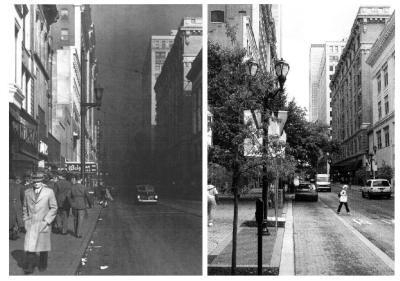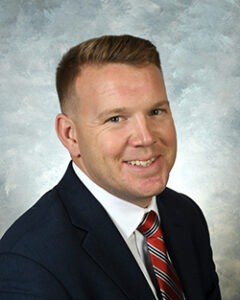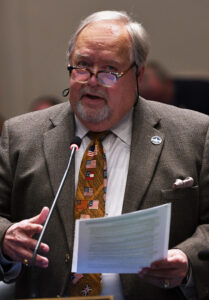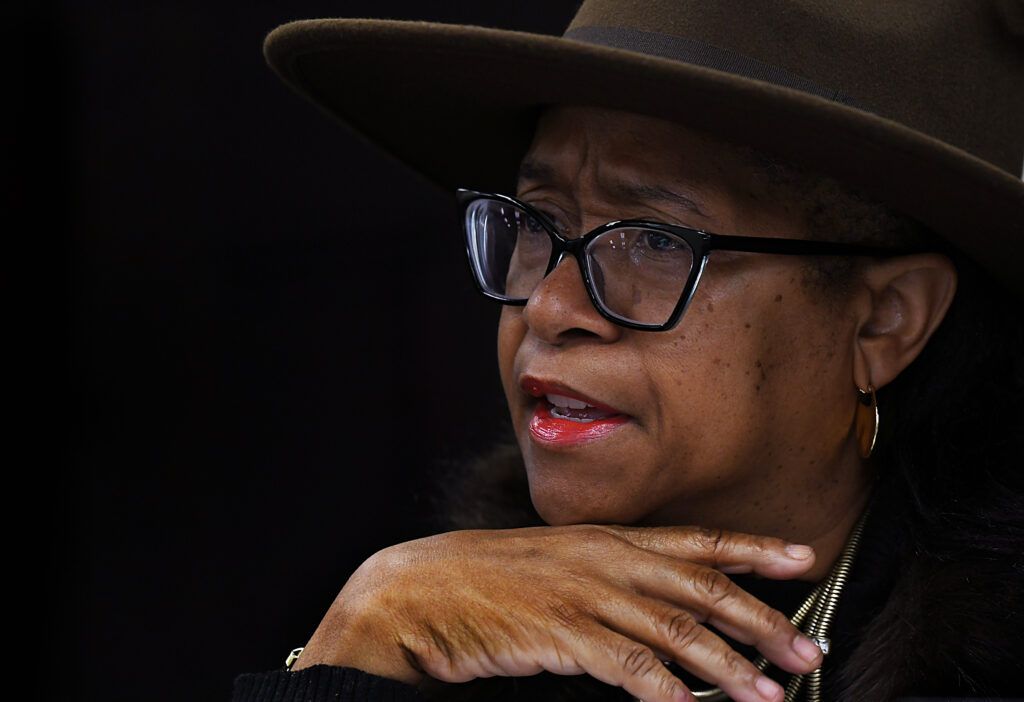16:00
News Story
Bill curbing fines for Louisville air pollution raises questions about sponsor’s self-interest
An advisory ethics opinion stated there was no conflict of interest with lawmaker’s sponsorship

The Air Pollution Control District of Jefferson County was created after the Kentucky legislature enacted authorizing legislation in 1952. It replaced the Louisville Smoke Commission and was staffed with air quality professionals and overseen by a board. The photos above show Louisville’s Fourth Street before and after the Clean Air Act, first passed by the U.S. Congress in 1963 and later expanded. (LouisvilleKy.gov)
FRANKFORT — Louisville’s air pollution authority would lose the power to issue fines in some circumstances under a bill that has Democratic lawmakers asking if the Republican sponsor’s employer stands to benefit from the proposed change in the? law.

House Bill 136, sponsored by Rep. Jared Bauman, R-Louisville, would bring the Louisville Air Pollution Control District (APCD) under a state law that allows industrial polluters to avoid civil penalties if they? self-report air pollution violations and rectify the issue. Currently, industrial air pollution in 119 counties is regulated by the Kentucky Energy and Environment Cabinet through that legal framework. Jefferson County and Louisville is the only exception, regulated separately by the APCD. HB 136 would include the APCD under that state framework.
Bauman in the Thursday meeting of the House Natural Resources and Energy committee, sitting next to a lobbyist from the Kentucky Association of Manufacturers who was supporting the bill, said HB 136 was about making sure “good actors within Jefferson County” have the “same privilege” as industries elsewhere in the state if they self report and fix “environmental incidents.”?
But lobbyists with the environmental advocacy group Kentucky Resources Council say industry is already required to regularly conduct inspections and report non-compliance through permitting issued via the Clean Air Act. Audrey Ernstberger, a lobbyist with the council, told the committee Thursday the bill essentially gives industry a “free pass” from potential penalties when a self-disclosure of a violation happens by ending the Louisville Air Pollution Control District’s ability to issue penalties in such cases.?
“We fear that the law could disincentivize industries from taking steps to eliminate violations, seeing as they won’t face penalty, and also further perpetuate environmental injustice borne by some Kentucky communities,” Ernstberger told lawmakers.?
Bryon Gary, an attorney with KRC who for years worked for Louisville’s APCD, in an interview with the Lantern, raised concerns that by limiting APCD’s penalty powers, HB 136, could lead the U.S. Environmental Protection Agency to revoke the authority of state officials or APCD to issue air pollution permits and instead impose a federal takeover of the process.?

Gary worries that the bill would allow industrial operations to more often violate air pollution regulations without the worry of penalties at the expense of the Louisville community.?
Rep. Jim Gooch, R-Providence, the chair of the House Natural Resources and Energy Committee, responded to concerns Thursday by the council saying it’s difficult to predict how the U.S. EPA will react to legislation such as HB 136 but that “recent Supreme Court rulings” have “pushed back” on actions by the federal agency.?
Rep. Lindsey Burke, D-Lexington, asked Bauman how the bill would not roll back progress Louisville, and specifically the neighborhood of Rubbertown, have made toward improving air quality.?
Bauman said issuing penalties to companies that are self-reporting violations would have an “adverse effect” with such companies demonstrating “undesirable behaviors” as a result of the penalties.?
The bill passed the committee on a party line vote and now goes to the House floor for consideration.
Sponsor works for Louisville chemical company subject to regulations
During that Thursday committee meeting, some Democratic lawmakers honed in on Bauman’s work and its potential connection to the legislation.?
Rep. Beverly Chester-Burton, D-Louisville, asked Bauman when he was presenting the bill if he worked for a company that would benefit from the bill.?

Bauman said he “worked in industry in Louisville” and that he contacted “our ethics division” that told him he was “absolutely compliant” with ethics policy to sponsor the bill.?
Chester-Burton then asked him if she could know what specific company he worked for.?
“I don’t think that’s relevant,” Bauman responded.?
According to a LinkedIn profile bearing Bauman’s photograph and name, he works as a continuous improvement manager for the Lubrizol Corporation, a chemical manufacturer with an operation near the Rubbertown neighborhood in Louisville where air pollution is regulated by APCD.?
A spokesperson for House GOP leadership shared with the Lantern an email exchange from the morning of Jan. 3 — the same day Bauman filed HB 136 — in which Bauman requested an informal advisory opinion from Laura Hendrix, the executive director of the Kentucky Legislative Ethics Commission. The commission provides confidential advisory opinions to lawmakers on various ethical situations.
“I want to be clear that it is okay for me to primary sponsor and vote on this bill,” Bauman said in his email request to Hendrix, mentioning he was employed by Lubrizol.?
Hendrix responded to him that morning saying there wasn’t a conflict of interest “as the legislation would affect all entities affected, including Lubrizol, the same.”??
“So long as legislation applies to other similarly situated businesses in the same way it applies to Lubrizol, there is no requirement to disclose or abstain,” Hendrix said. “It appears that this particular legislation would affect all similarly situated businesses in the same way.”
Hendrix cautioned Bauman to avoid conflicts when advocating for the bill as to not benefit his specific employer, Lubrizol.
Rep. Daniel Grossberg, D-Louisville, during the committee meeting asked if any committee members would benefit from HB 136. Gooch said such a question was out of order.

“We all can pass legislation and propose legislation as long as that legislation affects everyone. I don’t think that’s a relevant question,” Gooch said. “We’re not going to go there.”
In last year’s legislative session, House Majority Whip Jason Nemes, R-Louisville, said it was ethical to work as an attorney for a “gray machine” company while voting and advocating for legislation impacting the “gray machine” industry because it affected the industry as a whole, not just the individual company he represented.
Bauman declined to comment when asked by the Lantern Friday morning about the ethics opinion he referenced and questions from Democrats about his employment.?
Rep. Rachel Roarx, D-Louisville, who isn’t a member of the House Natural Resources and Energy Committee but advised Democratic committee members about HB 136, said it’s “concerning” that Bauman is sponsoring a bill that would potentially exempt his employer from air pollution penalties.?
She believed the public ultimately wants more “teeth” for APCD’s enforcement and more ways to influence APCD’s decisions.?
“Without the civil penalties,” Roarx said, “it takes away the real teeth that their actions have.”
This story has been updated to include an advisory opinion requested by Bauman from the Kentucky Legislative Ethics Commission.
Correction: the acronym for the Louisville Air Pollution Control District was previously misspelled.
GET THE MORNING HEADLINES.
Our stories may be republished online or in print under Creative Commons license CC BY-NC-ND 4.0. We ask that you edit only for style or to shorten, provide proper attribution and link to our website. AP and Getty images may not be republished. Please see our republishing guidelines for use of any other photos and graphics.
Liam Niemeyer
Liam covers government and policy in Kentucky and its impacts throughout the Commonwealth for the Kentucky Lantern. He most recently spent four years reporting award-winning stories for WKMS Public Radio in Murray.
Kentucky Lantern is part of States Newsroom, the nation’s largest state-focused nonprofit news organization.




